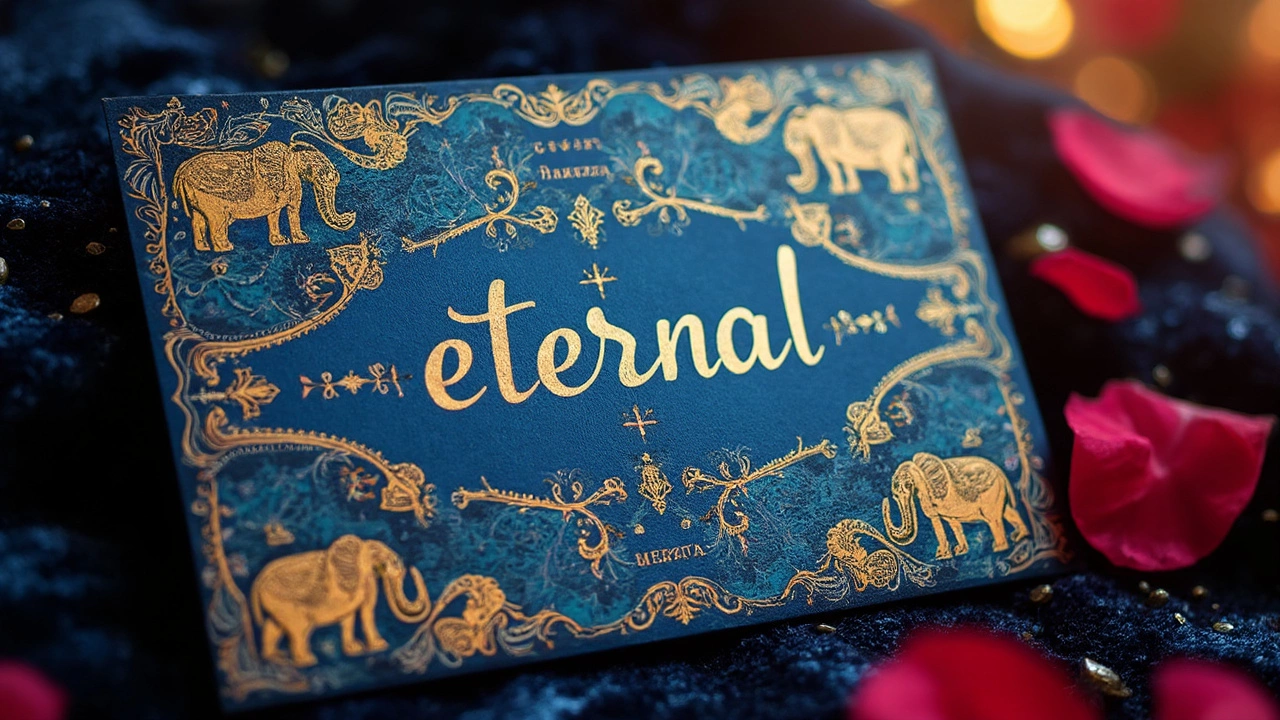The Strongest Word to Express Love
 Apr, 6 2025
Apr, 6 2025
Ever find yourself at a loss for words when trying to convey how deeply you feel about someone? You're not alone. Words have this incredible ability to shape emotions, and sometimes the simplest words carry the most profound meanings. But which word truly sums up the essence of love?
Consider the word 'eternal.' It not only suggests timelessness but also hints at a depth of commitment that goes beyond the here and now. Next time you’re trying to express the lasting nature of your feelings, 'eternal' might just do the trick. Relationships thrive on assurances of enduring love, and what better word than this to seal the deal?
- Why Words Matter in Love
- The Power of 'Eternal'
- Understanding 'Unconditional'
- When 'You' Says It All
- Tips for Expressing Love Through Words
Why Words Matter in Love
It's funny, isn't it, how words carry so much weight in defining our relationships? At the heart of expressing love lies the power of language. Sure, actions speak louder, but words give shape to feelings and intentions. Imagine saying 'I adore you' instead of the simple 'I love you'—it hits differently, doesn't it?
Words matter because they reveal what actions alone often can't. They are the bridge between hearts, allowing us to communicate what's inside. In his book "The Five Love Languages," Dr. Gary Chapman mentions, "Words of affirmation are one of the five ways people express and experience love deeply."
"Verbal compliments, or words of appreciation, are powerful communicators of love," says Chapman.
Getting the right words can make all the difference. Research even indicates that couples who regularly use affirming language are more satisfied in their relationships. Words like 'cherish,' 'adore,' and 'treasure' don't just sound good; they deepen connections by reinforcing commitment and appreciation.
Here's the thing, when you find the right expression of love, it sticks. You create a memory together—a little moment that becomes part of your story. It’s about setting a tone, making someone feel truly special, and words are your ally in this!
The Power of 'Eternal'
The word 'eternal' is like that vintage piece of jewelry—timeless and always in style when it comes to expressing love. It's not just a fancy word; it packs a punch with its promise of never-ending connection. When you say your love is eternal, you're saying that it's more than just a fleeting feeling—it's a commitment that stands the test of time.
Historically, the idea of eternal love has fascinated folks. Think about ancient myths and classic literature where eternal love stories like that of Artemis and Orion, or Romeo and Juliet, are legendary. They didn't use the word just for the sake of it; it symbolized an unbreakable bond.
Even in modern culture, using 'eternal' can enhance the depth of your messages. For instance, in letters, poems, or even a simple card, the addition of 'eternal' gives it that extra weight. Imagine someone reading, "My eternal love for you grows each day." It doesn’t just sound beautiful—it feels deeply heartfelt.
When you're in a relationship that you believe will last a lifetime, using 'eternal' isn't just a nice gesture; it sets a strong foundation of trust and durability. It implies a steady assurance that no matter what life throws your way, your feelings won’t fade.
Interestingly, surveys show that couples who use meaningful language like 'eternal' tend to describe their relationships as happier and more fulfilling. Maybe it's because the words we choose help shape our reality and push us to live up to them.

Understanding 'Unconditional'
The word 'unconditional' is thrown around a lot, but what does it really mean when we talk about it in the context of love? Well, at its core, unconditional love is all about acceptance without any strings attached. It's the kind of love parents often naturally provide; they love their kids no matter what, right?
In romantic relationships or friendships, this means accepting someone wholly, without expecting them to change for you. It's about loving them for who they are at their best and at their worst. When you tell someone you love them unconditionally, you're saying that your feelings aren’t based on what they do for you, but on who they are as a person.
Research shows that couples who practice unconditional love tend to have stronger, long-lasting relationships. How does it manifest in daily life? It might mean standing by your partner during a rough patch or supporting them in pursuing their dreams, even if it means temporary sacrifices on your end.
The challenge, though, is practicing this consistently. It’s about more than just saying 'I love you'—it's about showing it through actions. Simple things like being patient when your partner's having a tough day, or letting them have their moment when they need it, are part of this. It requires genuine empathy and understanding. Remember, unconditional love isn't blind; it recognizes faults but chooses to support and love regardless.
If unconditional love is new to you, start small. Think about what it means to you and how you can actively practice it. Maybe it's giving honest feedback in a supportive way or simply being there without judgment. These little things add up, and they show the kind of respect and love that lasts.
When 'You' Says It All
We often overlook the power of a single word: 'You.' When you're in love, the person you're with becomes your world. Talking about love usually makes us think of grand gestures and extravagant words, but sometimes just saying 'you' does the magic. It's not about the number of words; it's about how focused you are on them.
Think about it for a second. When someone says 'It's you I love,' the focus shifts entirely onto the person, making them feel special and unique. Those three letters pack a punch because it's personal and direct. You're not just tossing a word into the wind; you're addressing the one who means the world to you.
Moreover, 'you' becomes a keyword in intimate conversations. It creates a bridge of understanding between two people. Saying 'you make everything better' or 'there's nobody like you' clearly conveys that your affection is centered on them, and them alone. It’s like underlining their importance without needing a whole dictionary.
What's interesting is how marketers and companies often use 'you' in their advertising strategies. This approach personalizes the message, making it feel relevant and targeted. It’s no surprise that in personal relationships, 'you' works wonders to convey strong emotions.
The strength of 'you' in expressing love lies in its simplicity. It's direct, heartfelt, and unmistakably clear. Next time words fail you, remember that sometimes less is indeed more.

Tips for Expressing Love Through Words
Trying to put your feelings into words can be tricky, but it’s totally doable! We’re going to spill some secrets about how to make your expressions of love hit home.
- Be Honest: Start with the simple truth. Expressing love isn’t about crafting elaborate sentences; it's about sharing what you genuinely feel. When you tell someone you love them, make sure it's heartfelt and sincere.
- Use Specific Examples: Sure, saying 'I love you' is classic, but it’s even more powerful when you back it up. Mention specific instances or qualities you admire, like 'I love how you always know how to make me laugh after a tough day.'
- Keep It Simple: Sometimes less is more. Simple expressions like 'I miss you' or 'Thinking of you' can speak volumes without needing a lot of words.
- Get Creative: Write a little note, text, or even a poem if you’re feeling imaginative. It doesn't have to win awards; it just needs to come from the heart.
- Listen to What They Need: Pay attention to how your loved ones express and receive affection. Some folks light up with words, while others prefer actions or gifts. Tailor your approach to what works best for your relationship.
Being genuine and thoughtful in how you convey love can create a stronger connection. Remember, when in doubt, just be yourself!